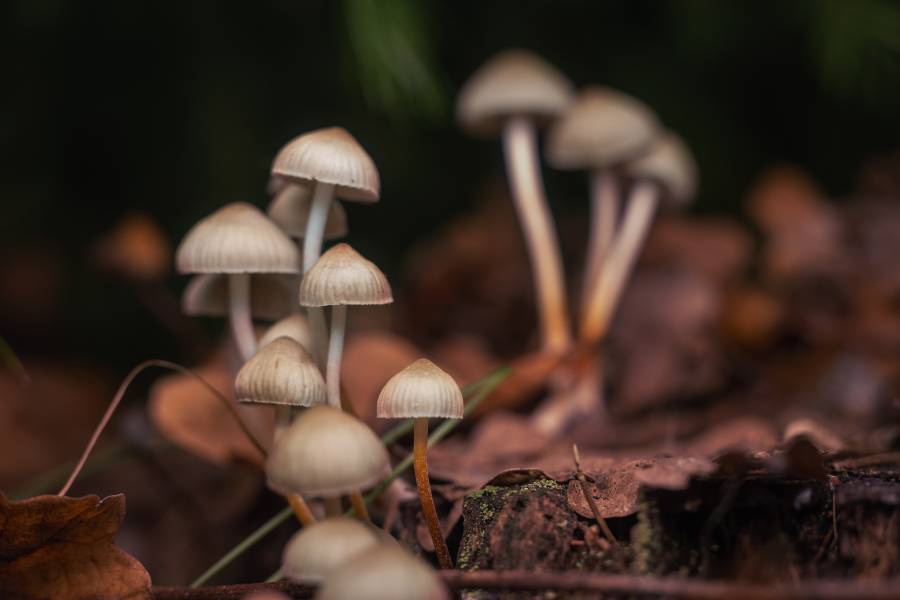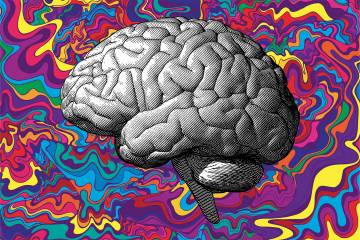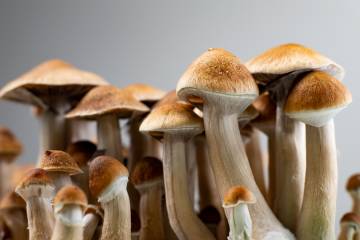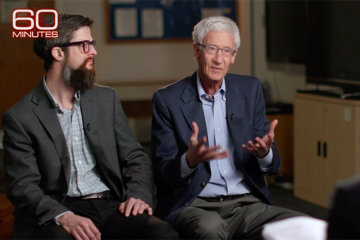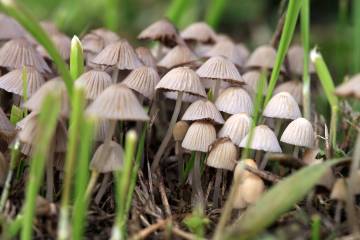On Election Day, Oregon became the first state in the nation to elect to legalize psilocybin—the active compound in so-called "magic" mushrooms—for therapeutic uses. At the same time, Washington, D.C., joined a host of U.S. cities that have lowered or eliminated the criminal penalties for the use and sale of mushrooms.
These moves follow a gradual cultural shift in recent years toward mainstream acceptance of psychedelic drugs, particularly as interest grows in their possible medical and psychiatric benefits. At Johns Hopkins University, researchers including Matthew Johnson have led pioneering studies on psilocybin's potential to help with conditions including cancer-related distress, depression, addiction, anxiety, and Alzheimer's disease.
Johnson, a professor of psychiatry at Hopkins, spoke with the Hub recently about Oregon's path to developing a full-fledged medical program, the distinctions between legal mushrooms and legal cannabis, and the forecast for future psychedelic research.
What needs to happen for Oregon's measure to turn into a successful psilocybin program?
Measure 109 in Oregon explicitly builds in a two-year period to figure out a lot of details of this program. One stated goal is to coordinate with federal authorities, which I think is very important. But it's not clear what that looks like. Psilocybin-containing mushrooms are still classified as a Schedule 1 compound in the U.S., meaning they're illegal at the federal level even for medical uses. Could there be some kind of officially stated federal tolerance for mushrooms, rather than just a tenuous and assumed understanding?
Safety standards are a huge issue. As clinical researchers, we get special permissions to work with psilocybin, and we follow extensive protocols. There are known risks related to psilocybin, and we have effective practices that squarely mitigate those risks. Would a state program adopt similar practices? For one, what will the screening of participants entail? Would it include an in-person structured psychiatric interview, for example, or just a two-minute questionnaire? Who will be dispensing the mushrooms, and what training and credentialing will they have? Would a physician be required to provide a physical, and will one be on call to quickly respond to a medical event? Will clinicians be able to participate without fear of risking their state license?
What sort of precedent does medical cannabis offer?
It's tempting to compare this to the progression of medical cannabis in the U.S., which has moved at the state level. That's not the best analogy, though, because, for one, the treatment model is just so different. In some sense, psychedelic therapy is more akin to an endoscopy or surgery in that it takes place in a designated setting for a designated time period during which risks increase. That's opposed to sending people home on their own with medications, like with cannabis—which is more like getting an anti-anxiety prescription.
Also see
Will Measure 109 affect the work of psychedelics researchers such as yourself?
Not directly. There's still a federal pathway you need to follow for clinical research with Schedule 1 drugs, which remains in place. Even researchers in Oregon, when Measure 109 is in effect, wouldn't be able to conduct federal studies to develop psilocybin as a medicine using the state framework there.
We see this issue even with cannabis, which is also Schedule 1. Researchers in Colorado, where both medical and recreational cannabis have been legal for years at the state level, can't go down the street to a dispensary and conduct clinical trials with that cannabis. They have to use cannabis grown at the University of Mississippi, due to federal guidelines.
You've written about the potential for reclassifying psilocybin as a Schedule 4 drug. What's the status of that effort?
Right now there are two ongoing late-stage clinical trials investigating mushrooms as a treatment for depression. If those trials are successful in showing sufficient safety and efficacy, the FDA would need to move psilocybin out of Schedule 1 to allow for medical use. Research on psilocybin from the last half-century suggests that Schedule 4, the same category as many prescription sleep medicines, would be appropriate, with additional rules such as limiting use to happen in clinics.
That change would open a lot of doors for researchers. There are a number of conditions beyond depression where psilocybin shows promise, like tobacco addiction, so the clinical trials need to expand. Frankly, our biggest obstacle is the lack of federal funding for therapeutic research.
In addition to Oregon's new law, we've seen a spate of recent of decriminalization measures in cities, including the new one in D.C. How do those fit into the big picture?
Well, first, I think in general removing criminal penalties for drugs is a good strategy with a solid basis in public health science. It's not encouraging the use of heroin or cocaine or what have you—it's acknowledging that you don't help the situation by adding problems like incarceration and criminal records that create obstacles to employment and educational opportunities. There are certainly exceptions like drunk driving or intoxicated violence, but in general our criminal justice system should not be our mechanism for dealing with drug use and addiction.
But let's keep in mind that the rationale for decriminalizing drug use really has little to do with the therapeutic development of psychedelics. For example, the decriminalization measure in D.C. uses language touting the various medical benefits of psilocybin—while the measure has nothing to do with setting up any medical uses. It shouldn't necessarily be the promising therapeutic research for a drug that justifies moving away from a criminal approach to a public health approach.
However, I think with these measures we do see the tide shifting on mushrooms, into more acceptance and more interest in medical and psychiatric uses. The stigma attached to mushrooms in the past, from its association with 1960s counterculture, is dying out. That's a positive for developing its medical potential.
Posted in Health, Voices+Opinion, Politics+Society
Tagged psychedelics, psilocybin, drug policy




